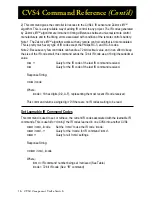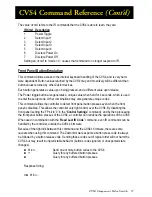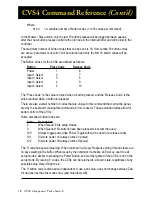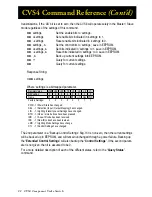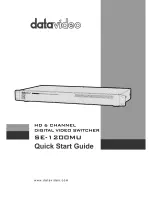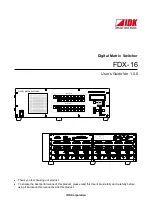
CVS4 Component Video Switch
An example with CRC-8 responses enabled is:
LI?:194<CR>
+<CR><LF>
=LI 2,13:87<CR><LF>
Notice that in the first example a checksum was not appended to the “
LI?
” command. When
issuing a command the checksum and CRC-8 codes are sent on a command by command
basis. Anytime a checksum or a CRC-8 code is appended to a command it will be checked and
validated by the device, regardless of the “Response Checksum / CRC-8” settings.
When Response Checksums, or Response CRC-8 Checkcodes are enabled, Error Response
strings will also have checksum and CRC-8 codes appended to them.
Master / Slave and Asynchronous Modes of Operation
The K.I.S.S.™ protocol can be used in a Master / Slave mode, where responses are only sent
when requested, or in an Asynchronous mode, where responses are sent whenever the opera-
tional state of the device changes, such as a front panel button being pressed.
The Master / Slave Mode of Operation
In the Master / Slave mode, the controller requests information from the device at polled
intervals. The control program assumes the role of the master, and the device is operated in the
slave mode. No information will be sent from the device without first receiving a request from the
controller.
For controllers that cannot handle having information being sent to them in the background, or at
unspecified times, the Master / Slave setting is ideal, since all state changes will be logged but
not sent until requested by the controller.
To allow for more efficient Master / Slave operations, there is a Query Status command available
to the controller that return the status state of the device as a bitmap of flags indicating which
states have changed and need querying. This allows the controller to poll, using a single com-
mand, and then based on those flag settings, issue only the commands needed to read the new
state(s) of the device.
The Master / Slave mode also allows for a predictable communications flow. A communication
sequence is always started by the controller by issuing a command. The response will always be
either the Acknowledgement Response, or an Error Response, followed by (if a query command
was issued) the Query Response. For instance:
LI ?<CR>
Sent: Controller issues a query command.
+<CR><LF>
Received: Acknowledgment (or possible Error) Response.
=LI 2,13<CR><LF>
Received: Query Response.
In the Master / Slave mode, the Acknowledgement or Error Response will always be the next re
-
K.I.S.S.™
(Continued)


















